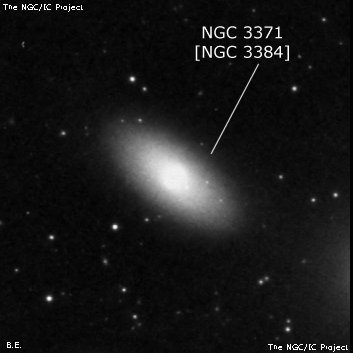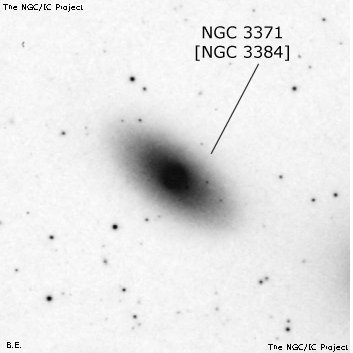NGC/IC Project Restoration Effort
(This is a very very beta version)
NGC3371


Basic Information
Location and Magnitude
Right Ascension: 10:48:16.7
Declination: +12:37:43
Constellation: LEO
Visual Magnitude: 9.9
Historic Information
Discoverer: Herschel J.
Year of discovery: 1830
Discovery aperture: 18.3
Observational
Summary description: eF, R, 2nd of 3
Sub-type: E/SB0
Corwin's Notes
=====
NGC 3371 is probably NGC 3384, and NGC 3373 is probably NGC 3389. JH's
descriptions are appropriate for the galaxies, and his measured position
angles -- 68.4 deg between his first and second objects, and 156.8 deg between
his second and third -- are a close match for those between N3379 and N3384
(66.5 deg), and N3384 and N3389 (154.7 deg), especially when precession is
taken into account.
However, JH has left us positions that suggest that these are companions of
NGC 3367, not NGC 3379. His position for N3367, the nominal first of the
three, exactly matches the position for that object measured on another night
when the additional two objects were not seen. Added to this is his
observation of N3389 on the same night the two questionable objects were seen.
Even so, my feeling is that he has somehow confused his observations of N3367
and N3379 on the night when he also measured the two companions.
Adding more mystery to the case is Peters's comment: "[N3371] was distinctly
seen by me 1880, Mar. 2; but [GC]2198, the third of the 'triple nebula,' could
not be found." (Peters's position is within 10 arcseconds of JH's.) There
are two faint stars within two arcmin of the nominal position for N3371;
perhaps Peters saw one of these. Dreyer notes in the GC Supplement that no
other observer had seen either N3371 or N3373 at JH's positions.
-----
Checking the sweep, I find that JH did not measure the positions for NGC 3371
and NGC 3373. Instead, he has offsets -- the position angles that he
published and [delta] RAs ("53" between his first and second objects and "24"
between his second and third. I assume these are seconds of time; he has no
units shown). I don't see [delta] NPDs, but it seems obvious that JH must
have made a mistake in his calculation of the positions from the offsets.
This leaves only Peters's observation to explain. Did he perhaps adopt JH's
position more or less blindly? I would be surprised if he did, so his
observation is still a mystery.
Steve's Notes
=====
NGC 3371
See observing notes for NGC 3384.



